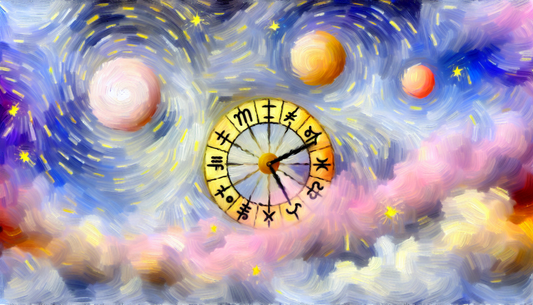Astrology has long been a subject of intrigue and debate, often viewed as a mystical guide to understanding human behavior and decision-making. As we delve into the capacity of astrology to aid in ethical decision-making, it’s vital to explore the principles behind both ethics and astrology, and how these two domains might interact to enhance our approach to personal and societal dilemmas.
Understanding Astrology and Its Components
Astrology's foundation lies in the belief that celestial bodies impact human affairs and natural phenomena. This ancient practice takes into account various components, including the zodiac signs, planetary movements, and astrological houses, each revealing different aspects of personality and circumstances.
Astrology helps individuals understand their motivations, strengths, and weaknesses better, shedding light on how they react to moral challenges. By recognizing their celestial influences, people can gain insights into what drives them and how they might navigate ethical dilemmas.

The Role of Ethics in Decision-Making
Ethics refers to a set of moral principles that guide a person's actions and decisions. These principles shape our understanding of right and wrong and influence our interactions with others. Consequently, ethical decision-making involves evaluating situations based on moral frameworks, including utilitarianism (the greatest good for the greatest number), deontological ethics (duty-based), and virtue ethics (character-based).
The intersection between astrology and ethics makes for an interesting exploration. Each zodiac sign carries its traits, quirks, and predispositions, influencing how individuals perceive ethics. For example, a Libra, known for its emphasis on balance and justice, might engage in ethical decision-making with a focus on equity, while a Scorpio might approach moral questions driven by intensity and depth.
Astrology as a Tool for Self-Reflection
Utilizing astrology as a tool for self-reflection can facilitate deeper understanding in ethical decision-making. By analyzing one’s birth chart, individuals may uncover inherent biases or inclinations that affect their moral choices. This self-awareness paves the way for more conscious decision-making processes.
Through astrology, individuals may also confront areas of potential growth. For instance, a person influenced by a challenging aspect in their natal chart may acknowledge moments when their actions are reactive rather than reflective. Recognizing these patterns allows individuals to recalibrate their approach to ethical situations, ensuring that their choices align more closely with their values.

The Influence of Lunar Phases and Transits
Another intriguing aspect of astrology is the role of lunar phases and planetary transits. Each new moon and full moon marks opportunities for intention-setting and reflection, aligning perfectly with ethical decision-making processes. Understanding these celestial patterns can guide individuals on when to engage in difficult conversations, address conflicts, or pursue new endeavors.
For instance, during a full moon, emotions are heightened, providing a perfect moment for introspection and clarity regarding ethical dilemmas. Similarly, the retrograde motions of planets often encourage individuals to revisit past decisions, allowing for a critical evaluation of one's ethical stances and actions.
Integration of Astrology into Daily Life
Incorporating astrology into daily routines may also aid in nurturing ethical decision-making practices. This can include engaging in astrological practices, such as journaling during significant celestial events or setting intentions aligned with one’s astrological sign evolution.
Furthermore, the rising interest in astrology has led to a realm of community engagement and dialogue. By discussing astrological insights with others, individuals can consider diverse perspectives and apply them to ethical discussions, thereby enriching their decision-making processes.
Considerations and Limitations
While astrology offers a unique perspective, relying solely on it for ethical decision-making poses challenges. Ethical judgments often depend on context, culture, and personal experiences that astrology might not fully capture. It’s essential to balance astrological insights with rational thought and ethical principles, ensuring well-rounded decisions.
Moreover, one must be cautious of potential misconceptions surrounding astrology, as oversimplification may lead individuals to justify poor decisions based on their astrological profiles. Emphasizing personal responsibility and ethical accountability remains crucial, regardless of guiding celestial influences.
Conclusion: A Balanced Approach
Astrology can certainly provide a fascinating lens through which to navigate ethical decision-making. By understanding one's astrological influences and applying this knowledge to self-reflection and decision-making processes, individuals may develop a richer, more nuanced approach to ethics.
However, astrology is just one tool in the broader context of ethical deliberation. Ultimately, integrating self-awareness, external perspectives, and ethical principles remains essential in making sound decisions that honor both individual values and the collective good. Embracing a balanced approach ensures that one's journey through the cosmos adds depth and wisdom, guiding not just personal growth, but also contributing positively to the world around us.















